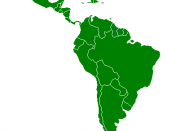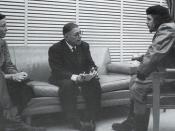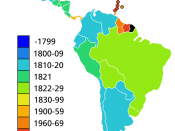The 1950's was a determining period in world history, the allies had won World War II five years before, and the world objectives were drastically changing. Before the 1950's the number one priority for the Americas was to end the war in Europe, and defeat the Axis. During this period, Latin America prospered, mainly because of the industrialization that took from the 1930- 1950. During this period, Latin America's economy boomed on exports for the war effort. However, by the 1950's when the thoughts of World War II were over in Latin America, efforts turned within Latin American countries. The Latin American was shocked that after the War, European Nations were helped economically, while Latin America was ignored completely; this and the fact that the United States controlled most of Latin America's profitable businesses ignited several social movements within Latin America. Already by the early 1950's Latin America began to see their "good neighbor," the United States as their imperialistic adversary.
Soon, after anti-American sentiment was often related to Marxism or as often referred to populism. Populism deferred from previous oligarchies, it was rather a form of government in which power was kept away from old coalition, a combination of oligarchies and foreign investment, instead supporting the national industry. Despite this lifted hopes for most of the population, especially middle and lower class, it was not widely accepted within the high since they were dominating landowners, and populism would bring about land redistribution. The Motorcycle Diaries by Ernesto Che Guevara and The Art of Political Murder by Francisco Goldman provide firsthand accounts of how the socialists' development occurred in Latin America. (Chasteen 240)Pre 1960's, Argentina was the richest, most industrialized, urban and literate country in Latin America, however, as in other Latin American countries, it was witnessing a nationalist movement.


